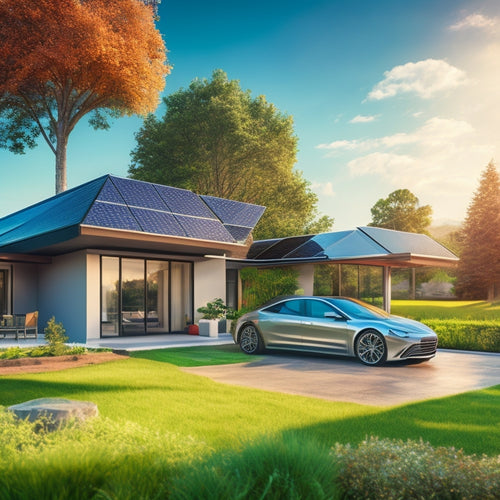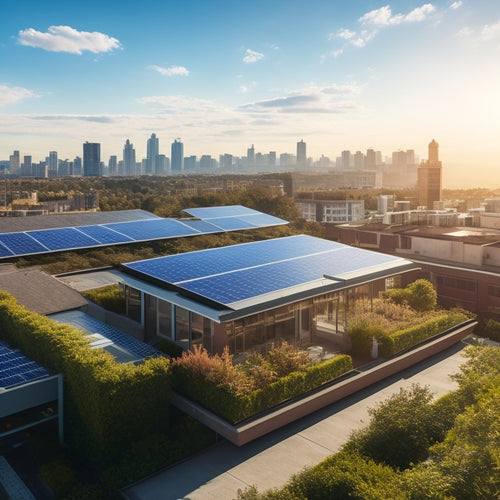
Why Invest in Home Solar Panels Today?
Share
By investing in home solar panels, you can claim a substantial portion of the total cost as a credit against federal income taxes, greatly reducing your tax liability and providing a substantial return on investment. You'll also benefit from state and local incentives, net metering programs, and increased property value. With low-interest loan options available, going solar is more accessible than ever. Plus, you'll reduce your energy bills and carbon footprint. By investing in home solar panels today, you'll not only save money, but also contribute to a cleaner, more sustainable future - and there's even more to explore.
Key Takeaways
• Invest in home solar panels to claim a substantial portion of the total cost as a credit against federal income taxes, reducing tax liability.
• Take advantage of state and local incentives, including rebates and grants, to reduce the upfront cost of installing solar panels.
• Increase your property value by up to $15,000 with the installation of a solar panel system, providing a significant resale advantage.
• Finance your solar panel system with low-interest loan options, making it more accessible and affordable than ever before.
• Benefit from net metering programs, generating your own electricity and offsetting energy consumption, reducing utility bills and increasing energy independence.
Federal Tax Credit Benefits
By investing in home solar panels, you can tap into the federal tax credit benefit, which allows you to claim a substantial portion of the total cost as a credit against your federal income taxes. This lucrative incentive can greatly reduce your tax liability, providing a substantial return on your investment.
As a savvy investor, you'll appreciate the tax savings strategies that come with going solar. By claiming the federal tax credit, you can offset a significant portion of your solar panel installation costs, resulting in notable savings.
As a champion of renewable energy advocacy, you'll be pleased to know that the federal government is committed to promoting clean energy solutions. By incentivizing homeowners to invest in solar energy, the government is driving a shift towards a more sustainable future.
State and Local Incentives
Beyond the federal tax credit, you can also capitalize on state and local incentives that offer additional savings and benefits for homeowners who invest in solar energy systems.
These incentives vary by state and locality, but they can greatly reduce the upfront cost of installing solar panels. You may be eligible for government rebates, which can provide a one-time payment or credit towards your solar panel system.
Community grants are also available, offering funding for solar energy projects that benefit local communities. Additionally, some states and local governments offer property tax exemptions or reductions for homes with solar panels, which can lead to long-term savings.
Net Metering Programs
Through net metering programs, you can generate your own electricity and export any excess to the grid, offsetting your energy consumption and reducing your utility bills. This way, you'll only pay for the net amount of energy you consume from the grid.
By installing solar panels, you'll be generating clean energy during the day, which can then be stored in energy storage systems for later use or exported to the grid. Utility partnerships play an essential role in facilitating this process, as they provide the infrastructure and monitoring systems to track your energy production and consumption.
With net metering, you'll have more control over your energy usage and costs, allowing you to optimize your energy storage and consumption patterns. By leveraging these programs, you'll be able to maximize your energy independence and savings, making your investment in home solar panels even more valuable.
Increased Property Value
How much more valuable will your property become once you've installed a solar panel system? The answer is significant. Installing a solar panel system can increase your property value, providing an appraisal boost that sets your home apart from the competition. According to the National Renewable Energy Laboratory, homes with solar panels sell for up to $15,000 more than similar homes without them.
Here's a breakdown of the average increase in property value based on system size:
| System Size | Average Increase in Property Value |
|---|---|
| 2-3 kW | $5,000 - $10,000 |
| 3-4 kW | $10,000 - $15,000 |
| 4-5 kW | $15,000 - $20,000 |
| 5-6 kW | $20,000 - $25,000 |
| 6+ kW | $25,000 - $30,000 |
This increased value translates to a significant resale advantage, making your home more attractive to potential buyers. With solar panels, you can enjoy the benefits of renewable energy while also boosting your property's value and appeal.
Low-Interest Loan Options
You can finance your solar panel system with low-interest loan options, which make going solar more accessible and affordable. With the cost of solar panels decreasing over the years, it's now more feasible to invest in a solar panel system for your home. Low-interest loan options provide you with the flexibility to install a solar panel system without breaking the bank.
Here are some benefits of low-interest loan options:
-
Energy Equity: You can own your solar panel system outright, increasing your energy equity and reducing your reliance on the grid.
-
Flexible Payments: Low-interest loan options offer flexible payment plans, allowing you to spread the cost of your solar panel system over time.
-
Increased Savings: By going solar, you can save money on your electricity bills, and with low-interest loan options, you can redirect those savings towards paying off your loan.
With low-interest loan options, you can enjoy the benefits of solar energy while keeping your upfront costs low. This makes it easier to invest in a solar panel system, increasing your energy independence and reducing your carbon footprint.
Frequently Asked Questions
How Long Does a Typical Solar Panel System Last?
You can expect a typical solar panel system to last around 25-30 years, with proper system maintenance ensuring peak performance, and high-quality panels showcasing impressive durability, guaranteeing a reliable source of renewable energy for your home.
Can I Install Solar Panels on My Own?
You might be tempted to install solar panels on your own, but beware of DIY frustrations and safety concerns, as improper installation can lead to reduced efficiency, electrical shocks, or even fires.
Are Solar Panels Damaged by Hail or Heavy Rain?
"When the storm hits, you're not left high and dry - top-tier solar panels are built to withstand harsh weather, with robust weather resistance and storm protection ensuring minimal damage from hail or heavy rain."
Can I Use Solar Panels to Charge My Electric Vehicle?
You can use solar panels to charge your electric vehicle, leveraging Vehicle Incentives, and optimize EV Charging by installing a dedicated 240-volt charging station, ensuring efficient and sustainable energy replenishment.
Do Solar Panels Work During a Power Outage?
You'll be glad to know that solar panels can provide emergency power during a blackout, but only if you have a grid backup system, which allows you to store excess energy for later use.
Related Posts
-

What Solar Panels Work Best With EVS Online?
When shopping for solar panels online to power your electric vehicle, look for high-efficiency models that can withst...
-

What Makes a Road Bike-Friendly by Design?
As you plan and design roads, incorporating features like dedicated bike lanes, smooth surfaces, and traffic calming ...
-

What Is the Cost to Put in Solar Panels
You're likely considering solar panels for your home, and the most significant factor in your decision is the upfront...


